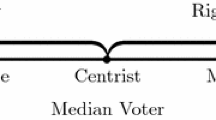Abstract
When reelection is uncertain, the election mechanism may provide insufficient incentives for politicians to implement socially desirable policies. In this paper, we show that threshold contracts that the candidates themselves offer during the campaign can help to alleviate the problem, even if the preferences of the candidates are unknown to the public. A threshold contract stipulates a policy space in which the implemented policy must lie for an elected candidate to have the right to stand for reelection.
Similar content being viewed by others
References
Akemann M, Kanczuk F (1999) Term limits and term lengths. Working Paper, University of Sao Paulo
Alesina A, Tabellini G (1990) Voting on the budget deficit. Am Econ Rev 80(1):37–49
Barro R (1973) The control of politicians: an economic model. Public Choice 14:19–42
Besley T, Coate S (1998) Sources of inefficiency in a representative democracy: a dynamic analysis. Am Econ Rev 88(1):139–156
Carey J, Niemi R, Powell L (2000) Term limits in state legislatures. University of Michigan Press, Ann Arbor
Dick A, Lott J (1993) Reconciling voters’ behavior and legislative term limits. J Public Econ 50:1–14
Ferejohn J (1986) Incumbent performance and electoral control. Public Choice 50:5–25
Gersbach H (1993) Politics and the choice of durability: comment. Am Econ Rev 83(3):670–673
Gersbach H (2002) Incentive contracts and elections for politicians and the down-up problem. In: Sertel M, Koray S (eds) Advances in economic design. Springer, Berlin, pp 65–78
Gersbach H (2004) Competition of politicians for incentive contracts and elections. Public Choice 121:157–177
Gersbach H (2005) Designing democracy, ideas for better rules. Springer, Berlin
Gersbach H, Liessem V (2003) Incentive contracts and elections for politicians with multi-task problems. CEPR discussion paper no. 4075
Gersbach H, Liessem V (2005) Reelection threshold contracts in politics. CEPR discussion paper no. 5175
Glazer A (1989) Politics and the choice of durability. Am Econ Rev 79(5):1207–1213
Homburger B (2005) Rede der FDP/DVP-Landesvorsitzenden. Traditionelle Dreikoenigskundgebung der FDP/DVP Baden-Wuerttemberg am 6. Januar 2005 in Stuttgart
Lockwood B (1997) State-contingent inflation contracts and unemployment persistence. J Money Credit Banking 29:286–299
Lupia A, McCubbins D (1998) The democratic dilemma. Cambridge University Press, Cambridge
Persson T, Roland G, Tabellini G (1997) Separation of powers and political accountability. Q J Econ 112:1136–1202
Persson T, Svensson L (1989) Why a stubborn conservative would run a deficit: policy with time-inconsistent preferences. Q J Econ 104(2):325–345
Persson T, Tabellini G (1993) Designing institutions for monetary stability. Carnegie–Rochester Conf Ser Public Policy 39:53–84
Persson T, Tabellini G (2000) Political economics: explaining economic policy. MIT Press, Cambridge
Petracca M (1992) Rotation in office: the history of an idea. In: Benjamin G, Malbin M (eds) Limiting legislative terms. CQ Press, Washington, DC, pp 19–51
Svensson L (1997) Optimal inflation targets, conservative central banks, and linear inflation contracts. Am Econ Rev 87:98–114
Walsh C (1995a) Optimal contracts for central bankers. Am Econ Rev 81:150–167
Walsh C (1995b) Price stability as the objective of monetary policy and recent central bank reforms. In: Bernanke B, Rotemberg J (eds) NBER macroeconomics annual 1995, pp 237–252
Author information
Authors and Affiliations
Corresponding author
Rights and permissions
About this article
Cite this article
Liessem, V. Electoral competition, incentive contracts for politicians and unknown preferences. Soc Choice Welfare 30, 13–41 (2008). https://doi.org/10.1007/s00355-007-0218-3
Received:
Accepted:
Published:
Issue Date:
DOI: https://doi.org/10.1007/s00355-007-0218-3



